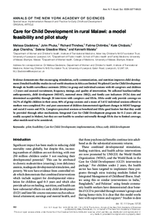Abstract
Evidence demonstrates that encouraging stimulation, early communication, and nutrition improves child development. Detailed feasibility studies in real‐world situations in Africa are limited. We piloted Care for Child Development through six health surveillance assistants (HSAs) in group and individual sessions with 60 caregivers and children <2 years and assessed recruitment, frequency, timings, and quality of intervention. We collected baseline/endline anthropometric, child development (MDAT), maternal stress (SRQ), and family care indicators (FCIs) data and determined acceptability through 20 interviews with caregivers and HSAs. HSAs could only provide coverage on 14.2% of eligible children in their areas; 86% of group sessions and a mean of 3.6/12 individual sessions offered to mothers were completed. Pre‐ and post‐assessment of children demonstrated significant changes in MDAT language and social Z‐scores and FCIs. Caregivers perceived sessions as beneficial and HSAs good leaders but that they could be provided through other mechanisms. Integrated Care for Child Development programs for 0–2 years old are readily accepted in Malawi, but they are not feasible to conduct universally through HSAs due to limited coverage; other models need to be considered.

